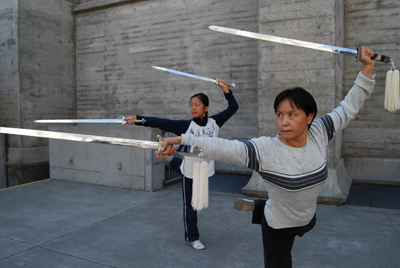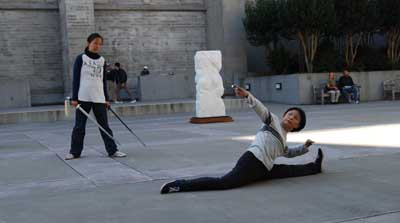 Since she was sixteen years old, San Francisco-based master artist Ling Mei Zhang has practiced Chinese sword dances, mastering both the single and double straight sword techniques, and representing China as a cultural ambassador to countries around the world. Zhang studied wushu double straight swords from Liu Yuhua in Heibei Province and Lee Wenjin in Beijing over forty years ago, becoming the national champion of the form in 1975. Considered one of the highest ranking martial artists from China currently living in California, Zhang is a seventh degree black-belt and one of three top women recognized in China for her double straight swords expertise and in influencing contemporary wushu, in addition to specialization in Cha Quan (slanted fist), contemporary Chan Quan (long fist), straight sword, spear, and Ba Gua Zhang.
Since she was sixteen years old, San Francisco-based master artist Ling Mei Zhang has practiced Chinese sword dances, mastering both the single and double straight sword techniques, and representing China as a cultural ambassador to countries around the world. Zhang studied wushu double straight swords from Liu Yuhua in Heibei Province and Lee Wenjin in Beijing over forty years ago, becoming the national champion of the form in 1975. Considered one of the highest ranking martial artists from China currently living in California, Zhang is a seventh degree black-belt and one of three top women recognized in China for her double straight swords expertise and in influencing contemporary wushu, in addition to specialization in Cha Quan (slanted fist), contemporary Chan Quan (long fist), straight sword, spear, and Ba Gua Zhang.
Building on a seasoned career with over thirty years as a teacher, Master Zhang participated in ACTA’s Apprenticeship Program this year with apprentice Ruth Yafonne Chen, also based in San Francisco, who has been studying wushu with Zhang over the past three years. Their participation in the Apprenticeship Program brought them together weekly outdoors at San Francisco’s Grace Cathedral Plaza, and focused on Zhang’s world-renowned specialty in wushu double sword technique, a form which dates back centuries in China to the Qin and Han dynasties (221BCE to 220 AD). Perpetuated predominantly by female master proponents of the form, the sword dance is one of the most popular Han Chinese dance forms which has been incorporated into Chinese acrobatics, Chinese dance performances since the Tang Dynasty, and Chinese operas since the Song Dynasty.
This incorporation of the sword dance into operatic forms informed Zhang’s approach in working with Chen during the apprenticeship. Zhang created a sword routine dance personally inspired by the legendary Beijing opera star Mei Lan Fang (1894-1961), who famously incorporated wushu and double swords into one of his solo routines in the famous opera Farewell My Concubine (Ba Wang Bie Ji), a performance which left an indelible impression on Zhang when she witnessed it as a young woman and opera fan.
 Zhang refined double sword choreography for Yafonne to perform on stage, interweaving many wushu and tai chi routines as well as opera movement. Though this is the first time Zhang has realized this vision, it has lived with her for many years. Couched within this piece are fundamental double sword techniques and exercises which enabled Yafonne to practice daily. Over the course of the apprenticeship, Zhang taught the choreography to Chen as well as worked on details including timing, proper angles, force, execution, precision of sword placement and proper integration with the music. Zhang created this piece specifically for Yafonne as a means to teach the technique to her. At the same time, Zhang noted that “it is because of Yafonne’s love of the double swords that this piece could be realized.”
Zhang refined double sword choreography for Yafonne to perform on stage, interweaving many wushu and tai chi routines as well as opera movement. Though this is the first time Zhang has realized this vision, it has lived with her for many years. Couched within this piece are fundamental double sword techniques and exercises which enabled Yafonne to practice daily. Over the course of the apprenticeship, Zhang taught the choreography to Chen as well as worked on details including timing, proper angles, force, execution, precision of sword placement and proper integration with the music. Zhang created this piece specifically for Yafonne as a means to teach the technique to her. At the same time, Zhang noted that “it is because of Yafonne’s love of the double swords that this piece could be realized.”
As a highly trained Han Chinese dancer and dance teacher, Chen first met Zhang upon approaching Zhang for an interview for a newspaper story. From that first meeting, Chen’s steadfast persistence to encourage Zhang to teach Chen and others who had yet to achieve advanced levels in the forms made Zhang realize that Chen “was serious and willing to work hard to learn, so I agreed to teach. Because Chen comes from a dance background, it is easy for her to memorize and pick up on movement combinations.”
As a dancer, Chen recognized the precious opportunity to work with Zhang, understanding that “learning Chinese sword dances from a martial artist is more effective than learning it second hand from a Chinese dance or Chinese opera teacher.”
Further, Chen reflected that “growing up [in the United States] can be confusing culturally. To learn from Master Zhang makes me feel rooted and connected, goes back hundreds of years.” Their work together has deepened Chen’s understanding of her Chinese culture and roots. When executing movements taught to her by Master Zhang, Chen expressed that “I feel it in my bones. The movement fit like a glove. I have never felt that before.”
